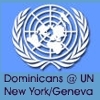

| BRIEFING - September 26, 2012 | To learn more about the Millenium Development Goals, click on the graphic Read the summer edition of the newsletter “Dominicans at the UN” (PDF) Past Briefings: September 12, 2012 August 29, 2012 July 11, 2012 May 30, 2012 May 16, 2012 April 18, 2012 April 4, 2012 March 7, 2012 February 22, 2012 February 8, 2012 January 25, 2012 January 11, 2012 |
|
Setting goals to foster sustainable human development The 67th Session of the United Nations General Assembly opened on Sept. 18, under the presidency of H.E. Vuk Jeremic, the former Minister of Foreign Affairs of the Republic of Serbia. Mr. Jeremic has chosen “Bringing about adjustment or settlement of international disputes or situations by peaceful means” as the theme for the coming year. Given the increasing levels of violence Among the key topics to be discussed are:
A theme woven throughout all the General Assembly proceedings and the work of its main committees will be that of the Post-2015 development agenda. As you may recall, the target date for achieving the Millennium Development Goals was 2015. In the midst of it all, the world experienced a devastating economic and financial crisis, which resulted in decreased donor funding to the developing world. Then, this past June, the RIO + 20 Earth Summit issued a final outcome document that, among other things, calls upon the United Nations to establish a set of Sustainable Development Goals (SDGs) to complement and expand upon the MDGs. These SDGs are expected to set goals and targets needed to facilitate progress in human development in balance with planetary limits. During the current General Assembly session, a working group will be established to draft goals and target dates for the proposed SDGs. This process, which will run the better part of a year, will ultimately determine whether the SDGs will represent economic development as “business as usual,” or whether they will set us on a course towards a more sustainable world—respectful of the integrity of Earth and lived within planetary limits. In light of this ongoing conversation on sustainability and sustainable development, here are a few thoughts on the notion of “sustainability” that may be helpful to you: (courtesy of Sustainable World Initiative, Washington, DC.) Sustainable development is not the same as sustainability. From a natural resource perspective, sustainability means that we do not take resources from nature faster than nature can replenish them. For a forest, it means that we do not harvest trees faster than the forest can regrow them; otherwise, the forest will be destroyed. While making development more efficient and more sustainable is important, it does not necessarily guarantee that we are living within the planet’s limits. We are already consuming resources at an unsustainable rate. Every two years, the Global Footprint Network and the World Wildlife Fund publish the “Living Planet” report. The 2010 report indicates that humankind is already over-using the renewable resource capacity of Earth’s biosphere by 50 percent. Climate change, peak oil, water scarcity, biodiversity loss and recurring food crises are all signs that humanity is overusing global resources. We are already in danger of breaking planetary boundaries. The Stockholm Resilience Center has identified nine “planetary boundaries,” which, if crossed, could cause irreparable damage to Earth, and harm prospects for future human well-being. The center suggests that three of these boundaries have already been breached: climate change, nitrogen loadings, and the rate of biodiversity loss. The other six—ocean acidification, stratospheric ozone, aerosol loadings, freshwater use, land use changes and chemical pollution—are approaching a level where abrupt global environmental change will be the long-term consequence. Scientists warn that by the year 2030, we may need two Earths to sustain our current living standards. Over the next year, we will provide you with ongoing information regarding the process to establish Sustainable Development Goals. No doubt there will be opportunity for people like yourselves—members of civil society—to be engaged in the process! On another note: I trust you noticed that the last Briefing was provided by my new Dominican Volunteer, Kati Garrison. Kati is a graduate of Notre Dame, where she received a BA in psychology with a minor in International Peace Studies. She also earned a master of philosophy in International Peace Studies with a concentration in Development and Humanitarian Aid from Trinity College, Dublin, Ireland. It is a delight to have Kati working along with me, and I am sure that you will be hearing from her frequently in this column! One more thing before I conclude: The NGO Sub-Committee on Poverty Eradication is in the process of gathering information on meaningful participation in decision-making of those who are living in poverty; how is it achieved, and what are the obstacles that must be addressed. The material will be submitted as input for the report of the Special Rapporteur on Extreme Poverty and Human Rights, for the Human Rights Council in June 2013. Would some of you be willing to respond to the questionnaire? You could speak from your own experience, as well as gather groups of people to reflect on the questions. This is a wonderful way to make sure that grassroots voices are heard. And it is also a way for us to collaborate in the work of justice! Please note that the deadline for submission is Oct. 31. Instructions on the cover letter indicate to whom the material is to be sent. If there are any questions, please do not hesitate to be in touch with me. The questionnaire is available in English and Spanish.
|
Dominican Leadership Conference
Building relationships and collaborating in the mission of preaching the Gospel
29000 West Eleven Mile Road
Farmington Hills MI 48336
248-536-3234 Contact: Executive Director

